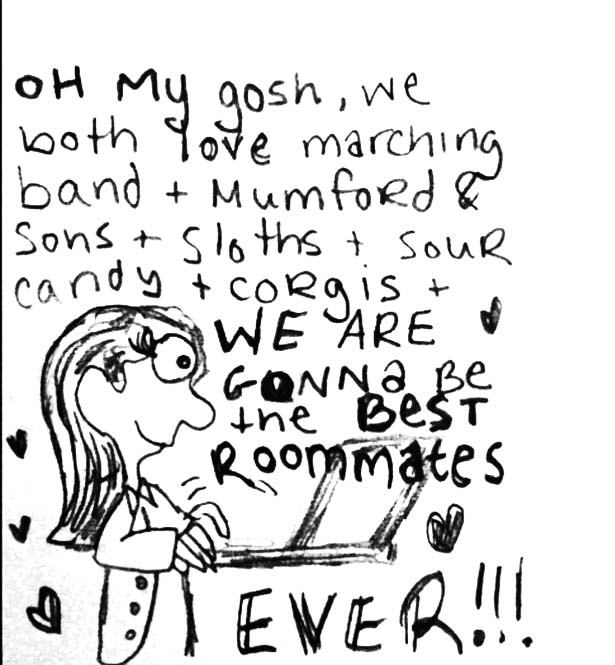While the spring semester has undoubtedly put the College of William and Mary’s student body in a tizzy over fall housing, the newly admitted Class of 2018 has to start from scratch. Who can forget the anxious fretting we all went through when attempting to choose our very first college roommate?
I spent hours patrolling my freshman class’s Facebook page, seeking out others who seemed to share some of my interests. I typed and retyped dorky autobiographies on RoomSurf, thinking for sure that my meticulously crafted self-descriptions would lure in at least a seemingly half-decent stranger. After awkwardly communicating with a few potential roommates, I got lucky enough to find someone who has become a wonderful friend and is prepared to put up with living with me for our next three years at the College.
Because of access to social media outlets such as Facebook and RoomSurf, the freshman roommate selection process has certainly become less of a scare. However, many people choose to avoid the toils of searching for someone online by adhering to the College’s system of randomly pairing freshman roommates.
Choosing to let the school assign a perfect stranger for you to live with must be a very daunting decision. No one wants to end up with the stereotypically insane roommate, complete party-animal, or total recluse. Everyone brave enough to receive a random roommate assignment hopes for a perfect match and if you are lucky, that is exactly what you will end up with. Unfortunately for some, these pairings end up consisting of awkward interactions and forced conversation — if there is any at all.
The College’s process asks four basic questions: Big or small dorm? Smoking or non-smoking? Morning or night person? Noise level preference in the room? While these ground rules are certainly helpful when determining elementary compatibility, they do not allow for much more than a tolerant relationship between the two random students. Perhaps it would be helpful if the College instated some sort of matching method that allowed incoming freshmen to elaborate on what they look for in a roommate, allowing the pairing process to have a little more depth. Some colleges with smaller undergraduate populations, such as Rice University, have special committees solely dedicated to matching roommates based on more detailed personality evaluations. The College would certainly benefit from a system like this; perhaps it could involve the students that are already either working for or interning with the Office of Undergraduate Admissions.
Speculation over a totally new random roommate selection process is certainly wishful thinking. Incoming freshmen who gamble with the system will have to rely on luck unless some sort of reform is introduced. Regardless of who the incoming freshmen end up with, I hope they realize that oftentimes those who end up with the worst roommates have the best stories to tell.
Email Vayda Parrish at vcparrish@email.wm.edu.

